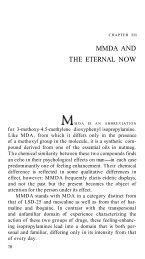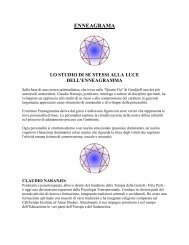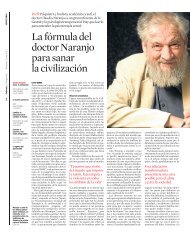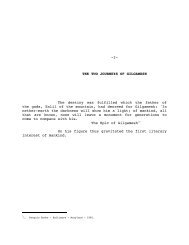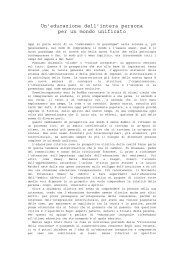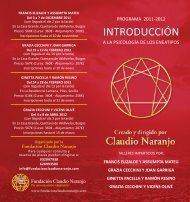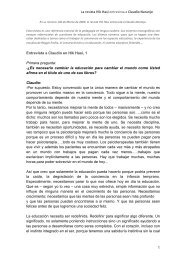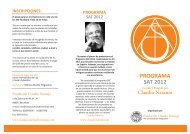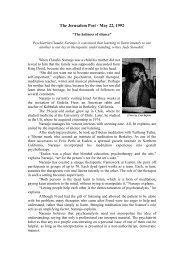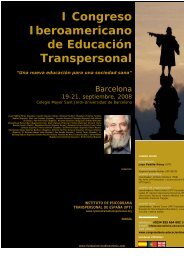Present – Centeredness in Gestalt Therapy Claudio Naranjo
Present – Centeredness in Gestalt Therapy Claudio Naranjo
Present – Centeredness in Gestalt Therapy Claudio Naranjo
Create successful ePaper yourself
Turn your PDF publications into a flip-book with our unique Google optimized e-Paper software.
<strong>Gestalt</strong> therapy techniques of suspend<strong>in</strong>g rem<strong>in</strong>iscence, anticipation, and th<strong>in</strong>k<strong>in</strong>g fall <strong>in</strong> with the<br />
implicit philosophy of asceticism <strong>in</strong> general: certa<strong>in</strong> deprivations are undergone <strong>in</strong> order to contact<br />
what is currently hidden by the psychological activity <strong>in</strong>volved <strong>in</strong> the renounced situations. This<br />
deprivation of sleep, talk<strong>in</strong>g, social communication, comfort, food, or sex is supposed to facilitate the<br />
access to unusual states of consciousness but is not an end or ideal <strong>in</strong> itself.<br />
The practice of attention to the stream of life relates to asceticism <strong>in</strong> that it not only entails a<br />
voluntary suspension of ego-gratification, but also presents the person with the difficulty of<br />
function<strong>in</strong>g <strong>in</strong> a way that runs counter to habit. S<strong>in</strong>ce the only action allowed by the exercise is that<br />
of communicat<strong>in</strong>g the contents of awareness, this precludes the operation of "character" (that is,<br />
the organization of copy<strong>in</strong>g mechanisms) and even do<strong>in</strong>g as such....<br />
PRESENT-CENTEREDNESS AS PRESCRIPTION<br />
Not all that is of value as a psychological exercise need automatically be a good prescription for<br />
liv<strong>in</strong>g. Free association may be a useful exercise, but not necessarily the best approach to<br />
conversation, just as the headstand <strong>in</strong> Hatha Yoga need not be the best posture to be <strong>in</strong> most of the<br />
time. To a greater or lesser extent, techniques have a potential for be<strong>in</strong>g carried <strong>in</strong>to ord<strong>in</strong>ary life,<br />
thus mak<strong>in</strong>g of life the occasion for a growth endeavor. Yet it is not only the specific value of a<br />
certa<strong>in</strong> approach that makes it appropriate as a prescription, but its compatibility with other<br />
desirable purposes <strong>in</strong> life; the degree of clash that it will br<strong>in</strong>g about with the exist<strong>in</strong>g social structure<br />
and, especially, its compatibility with a conception of the good society. Thus the abreaction of<br />
hostility <strong>in</strong> a situation of no constra<strong>in</strong>ts can be of value <strong>in</strong> psychotherapy, but is this approach the<br />
one that would maximize sanity and well-be<strong>in</strong>g <strong>in</strong> a community? I th<strong>in</strong>k that op<strong>in</strong>ions on the matter<br />
would be divided. They would be divided even on the question of truth. Whereas aggression tends to<br />
be socially reproved and the commandment states, "Thou shalt not kill", truth is commonly regarded<br />
as virtue, and ly<strong>in</strong>g a s<strong>in</strong>. One might therefore expect that the technique of self-disclosure, valuable<br />
<strong>in</strong> the context of psychotherapy, would be immediately applicable to life. Given the ord<strong>in</strong>ary<br />
condition of humanity, though, truth has been and may cont<strong>in</strong>ue to be not only uncomfortable or<br />
<strong>in</strong>convenient but dangerous. The example of Socrates, Jesus Christ, or the heretics at the time of<br />
the Inquisition, po<strong>in</strong>t out that an unconditional embrac<strong>in</strong>g of truth may mean the acceptance of<br />
martyrdom, for which I am sure the average human be<strong>in</strong>g is not ready. The desire to turn feel<strong>in</strong>gs<br />
<strong>in</strong>to prescriptions <strong>in</strong> cases where society did not make such a project feasible has been one of the<br />
implicit or explicit rationales <strong>in</strong> the creation of special communities among those who share the goal<br />
of liv<strong>in</strong>g for the <strong>in</strong>ner quest. In such groups, sometimes veiled by secrecy, man has sought to live<br />
accord<strong>in</strong>g to pr<strong>in</strong>ciples not compatible with other than a monastic, therapeutic, or otherwise special<br />
sett<strong>in</strong>g.<br />
Humanistic Hedonism<br />
Liv<strong>in</strong>g <strong>in</strong> the moment, <strong>in</strong> contrast to other techniques, seems a perfectly appropriate prescription for<br />
life. Moreover, it appears to be more <strong>in</strong> the nature of a technicalization of a life formula than the<br />
prescrib<strong>in</strong>g of a technique. The idea of prescription may evoke images such as that of the<br />
bad-smell<strong>in</strong>g tonic that children were frequently compelled to take "for their own good," before the<br />
time of gelat<strong>in</strong> capsules and flavor chemistry. This is part of a dualistic frame of m<strong>in</strong>d <strong>in</strong> which "the<br />
good th<strong>in</strong>gs" seem different from the "th<strong>in</strong>gs for our good," and the goal of self-perfect<strong>in</strong>g seems



